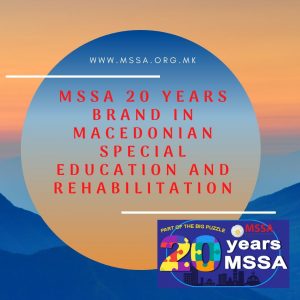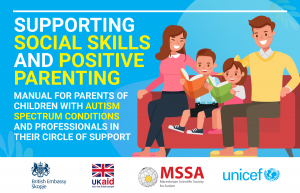Facebook
Linkedin
Email
Whatsapp
Respected colleagues and friends,
It is my great honour and pleasure to announce that Macedonian Scientific Society for Autism is celebrating its 20th birthday today, May 22nd. This period was neither too long, nor too short. The societies that can say they’ve achieved such a jubilee are scarce. The previous years were filled with turbulence in the socio-political field in Macedonia and this has been reflected in the society’s work. The activities were filled with highs and lows. Many members have marched though the society, out of which only the most persistent remain to ensure the implementation of its goals and responsibilities, which are the following:
- primary prevention of persons with autism;
- investigation mechanisms connected with autism;
- investigation the effects of rehabilitation on the persons with autism;
- treatment of the persons with autism;
- cooperation with the parents of the children with autism;
- coordination of governmental and non governmental organizations dealing with autism;
- cooperation with international universities and associations whose priority is autism.
During these past years, we have demonstrated an equal position with other societies of this type in the EU, leadership in the field of special education and rehabilitation of autism spectrum disorders (ASD) in Macedonia and primarily care for health, education and social protection of this fragile category of citizens. In these 20 years we have tried to increase our citizens’ awareness about this topic and this is especially visible in the past 10 years through a spread of activities in which we have included stage stars, actors, athletes, scientists, politicians and naturally families with children or other family members that have ASD. For this purpose, we have held big events for WAAD April 2nd – four times. We have also organized five professional tribunes which treat not only ASD, but Down syndrome as well. We were organizers or co-organizers of nine seminars, symposia and conferences, most of which had international participants. During this period, 250 free diagnostic and consultative exams have been done on children with ASD. In 2002, the brochure „Chater for Persons with autism in Republic of Macedonia” was published and it was distributed to all 120 parliament members at the time.
From 2008 until 2017 MSSA was co-publisher of Journal of Special Education and Rehabilitation and since 2019, it is also co-publisher of the international Journal for ReAttach Therapy and Developmental Diversities (https://jrtdd.com), whose publisher is ReAttach International Therapy Foundation from the Netherlands.
Our members have participated in over 100 local and international seminars, congresses and conferences. We are authors of over 60 articles on the topic of autism and slightly less than 10 of these have been published in journals with impact factor. This gives a particular scientific impact to the society in the world of autismology.
Our members have participated in 15 local and international project, some of which are “Equity and social inclusion through positive parenting”, “A hollistic approach of person-centred planning for people with Autism”, “Autism Social Skills and Positive Parenting Programme” and “Autism Friendly Spaces”. The mentioned projects have been realized in the past five years and some are still ongoing.
In the past years two school books titled “Autism” and “Autism and pervasive developmental disorders”, which are mainly meant for the students at the Institute of Special Education and Rehabilitation and the Institute of Psychology at the Faculty of Philosophy in Skopje and can be used by medicine students, have been published.
MSSA is present on social media every day with popular posts about ASD meant to educate the general population about this complex disorder in our community.
MSSA was supposed to celebrate the 20 years’ existence jubilee with a big conference that was set to happen May 29-31 in co-organization with our partners “ReAttach International Therapy Foundation” from the Netherlands, but unfortunately it was cancelled due to the Covid-19 pandemic. There were going to be more than 150 guests from our country, from around 20 other European and Asian states and from the USA. Because of this, we have switched to an internet campaign fit to honour this jubilee. This campaign is being shared on a daily basis on MSSA’s blog, and the official social media profiles on Facebook, Twitter, LinkedIn and Instagram.
We as members of MSSA will continue working and discovering new cases of autism, we will keep creating new projects, write scientific articles, help parents and naturally children and persons with ASD in direction of improving their life quality.
Please find 20 years of MSSA – presentation in Prezi on the following LINK.
Stay safe and healthy!
Sincerely,
President of MSSA




